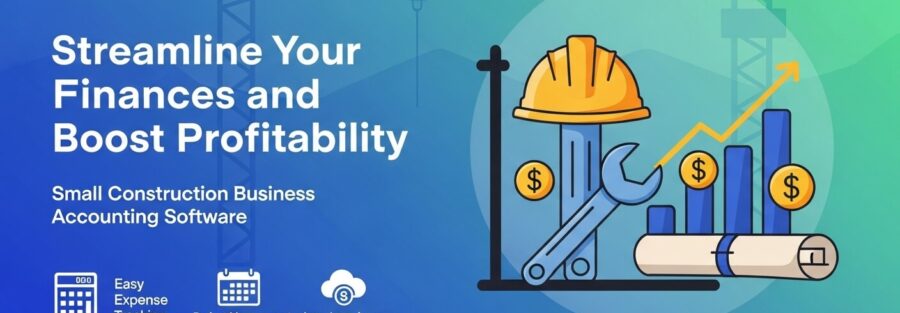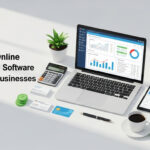Small Construction Business Accounting Software
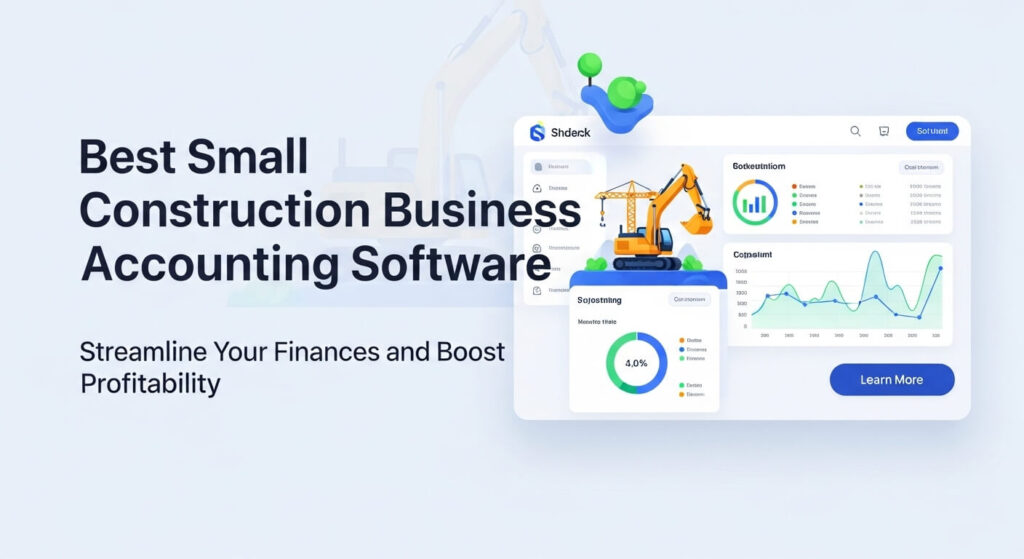
Table of Contents
Running a small construction business means juggling a lot. You’re building structures, managing teams, and making sure projects stay on track. But underneath all that hard work lies a complex web of money matters. Think about project-based accounting, keeping tabs on every job cost, managing your inventory, and paying subcontractors just right. Old-fashioned ways, like spreadsheets or paper ledgers, often fall short here. They can lead to errors, wasted time, and missed chances to make more money.
That’s where specialized accounting software steps in. It’s built specifically for the construction world. This kind of tool helps you conquer those financial challenges. It improves how accurate your numbers are, saves you hours each week, and gives you a clear picture of your business health. You can finally see where every dollar goes and how it comes back.
Ready to take control of your construction finances? This article will show you why specialized software is a game-changer. We’ll explore the key features you need to look for and help you pick the best solution for your business. Let’s make your money work harder for you.
Why Small Construction Businesses Need Specialized Accounting Software
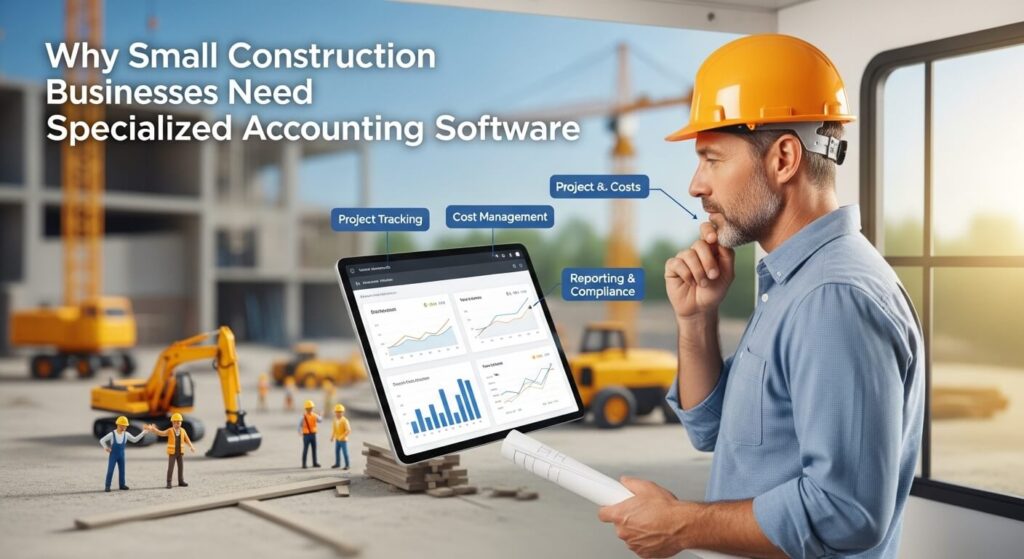
Tracking Project Profitability (Job Costing)
Every construction project is its own little business. You need to know if each one is making money or losing it. This is called job costing. Good software helps you track every single cost tied to a job. This includes wages for your crew, material costs, payments to subcontractors, and even equipment rental fees.
By comparing these costs to the project’s income, you see its true profit. Real-time job cost data is vital. It lets you make smart choices right away, preventing small problems from becoming big losses.
Managing Cash Flow Effectively
Cash flow in construction can be tricky. Money often comes in fits and starts, thanks to payment schedules and project delays. You might also deal with retainage, where clients hold back a portion of payment until a job is fully done. Accounting software helps here a lot. It makes invoicing faster and easier.
You can track who owes you money and when. It also helps you predict your cash needs. This prevents you from being short on funds when an important payment is due.
Compliance and Tax Preparation Made Easier
Construction has its own set of rules for money and taxes. You need to properly classify workers, handle sales tax on materials, and report to different governments. Mistakes can cost you big money in fines. Specialized software automates many of these tasks.
It helps you stay compliant without a headache. This means less stress during tax season and more confidence in your financial reports.
Improving Operational Efficiency
Imagine spending less time on paperwork. Accounting software automates many daily tasks. Payroll, invoicing, and tracking expenses become much simpler. This frees up valuable time for you and your staff. You can then focus on building and growing your business.
Integrated systems also cut down on data entry errors. This means smoother operations and fewer headaches overall.
Essential Features of Construction Accounting Software
Robust Job Costing and Budgeting
Your software needs to be a master of job costing. It should let you create detailed budgets for each project. Then, it tracks your actual spending against these budgets in real time. This way, you can easily see where you’re on target and where you might be spending too much. The software also helps allocate overhead costs, like office rent, to specific jobs for a truer picture of profit.
Integrated Payroll and Time Tracking
Handling construction payroll can be complex. You might deal with different pay rates, union dues, or even certified payroll for government jobs. Good software manages all these details. It keeps track of worker hours, handles deductions, and ensures everyone gets paid correctly. Integrated time tracking is a huge plus. It makes sure labor costs are linked to the right projects, giving you accurate job cost data.
- Actionable Tip: Check that the software can easily create or connect with tools for certified payroll reports if your business takes on government contracts.
Accounts Payable and Receivable Management
Managing who you owe and who owes you is key. The right software helps you track all vendor bills. It ensures you pay subcontractors on time. On the other side, it lets you generate professional client invoices. This includes progress billing and handling retainage. You can also monitor outstanding payments and gently remind clients when invoices are overdue.
- Real-World Example: A small plumbing company switched to [Software Name]. It automatically flagged overdue invoices and sent reminders. Their collections improved by a lot, helping their cash flow.
Inventory and Equipment Management
Materials are money sitting on a shelf. Your software should track your inventory, so you know what you have and what you need. It also helps manage equipment costs. This includes things like depreciation and maintenance. You can then assign these costs to specific projects. This gives you a clear view of total project expenses.
Reporting and Analytics
You need to know how your business is doing. The software should offer many customizable reports. These include profit and loss by job, job cost summaries, and Work In Progress (WIP) reports. You’ll also want clear cash flow statements. These reports give you valuable insights.
- Statistic: Businesses using specialized accounting software report up to a 20% bump in profitability. This is all thanks to better cost control and insights.
Mobile Accessibility
Your team isn’t always at a desk. Cloud-based software with mobile apps is a game-changer. Field staff can enter their hours and expenses on the go. They can even check project details right from their phones. This makes data collection faster and more accurate.
Choosing the Right Software for Your Small Construction Business
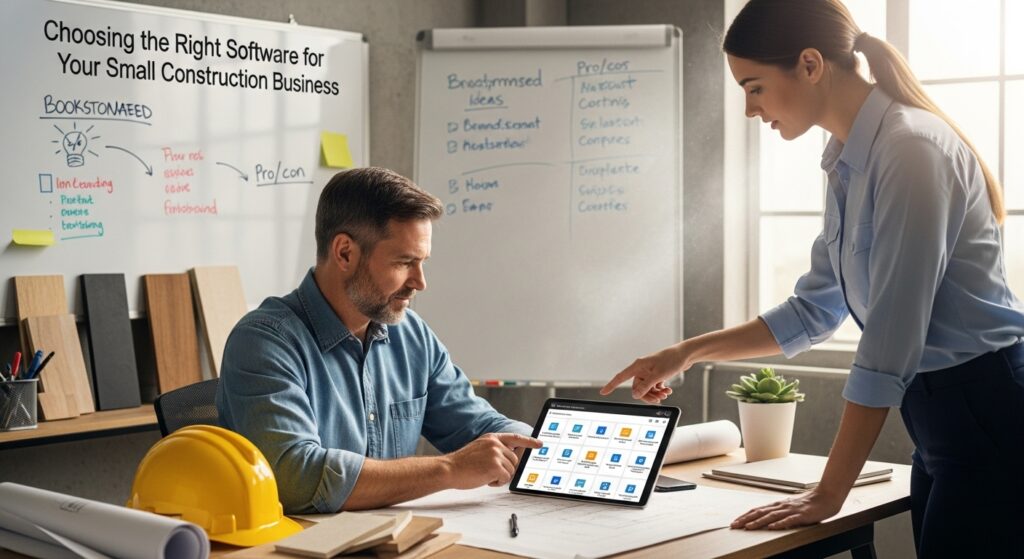
Assess Your Business Needs
Before you pick anything, think about your business. What are your biggest money headaches? How many projects do you run? Are they mostly homes or big commercial jobs? How big is your team? Answering these questions helps you pinpoint what you really need from the software.
Key Considerations: Cloud vs. Desktop
You’ll usually choose between cloud-based or desktop software. Cloud solutions, also known as SaaS, mean you access the program over the internet. They often have lower upfront costs and get automatic updates. You can use them anywhere. Desktop software is installed right on your computer. It might offer more customization and you own your data. Each has its pros and cons, so weigh them carefully.
Integration Capabilities
Your accounting software shouldn’t work alone. It’s better if it can talk to other tools you use. Think about project management software or document storage systems. Good integration means less double-entry and smoother workflows.
User-Friendliness and Training
The best software won’t help if your team can’t use it. It needs to be easy to learn and navigate. Check what kind of training is offered. Good customer support is also vital. Remember, a system is only good if people actually use it every day.
- Expert Quote/Reference: “The best accounting software is the one your team will actually use.”
Scalability and Cost
Think about where your business is heading. You need software that can grow with you. Look at how different solutions are priced. Some charge per user, others per feature. Consider the total cost of owning the software, not just the starting price.
- Actionable Tip: Always take advantage of free trials. They let you test the software’s main features and see if it feels right before you commit.
Popular Construction Accounting Software Options (Examples)
Overview of Leading Solutions
Several top-notch options exist for small to medium-sized construction businesses. QuickBooks Desktop Enterprise with its Contractor Edition is a popular choice for many. It expands on the familiar QuickBooks platform with contractor-specific tools. Sage 100 Contractor is another strong contender. It offers a more complete suite for growing businesses, including project management and service management. Smaller, cloud-based options like Buildertrend or CoConstruct also offer robust features, often blending accounting with project management.
- Real-World Example: A small general contractor found [Software Name, e.g., Buildertrend] perfect. Its easy-to-use interface and great mobile time-tracking were big wins for their crews.
Key Differentiating Factors
Each software has its unique strengths. QuickBooks is often chosen for its ease of use and widespread familiarity. Sage 100 Contractor shines for its deep reporting and comprehensive suite for those needing more complex features. Newer cloud platforms might stand out with their strong project management tools. They often have excellent client communication features. Think about your specific needs. Are you mainly looking for job costing? Or do you need a full package that includes scheduling too?
Implementing and Maximizing Your Accounting Software
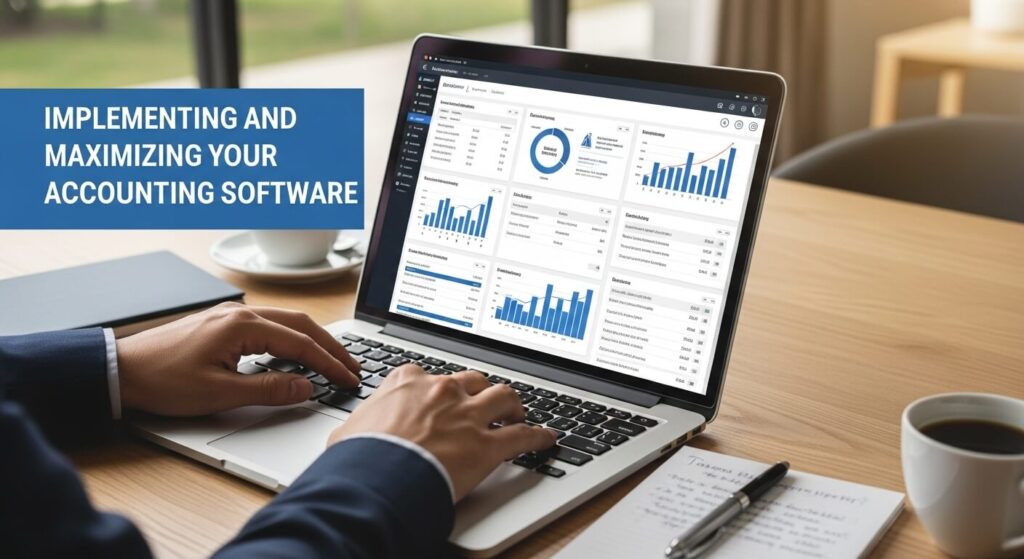
Data Migration and Setup
Moving your old financial data into new software is a big step. Make sure your existing data is clean and organized first. Setting up your chart of accounts correctly from the start is also very important. This ensures your financial records are accurate and useful.
Training Your Team
Your new software will only be effective if everyone knows how to use it. Provide thorough training for all staff members who will touch the system. This helps them understand their roles and how to input data correctly. Proper training leads to better data and smoother operations.
Regular Review and Optimization
Don’t just set it and forget it. Look at your reports often. Identify areas where you can improve how you use the software. As your business grows, explore more advanced features. This keeps your system working hard for you.
- Actionable Tip: Schedule monthly meetings to review the key financial reports from your software. This helps you make smart business decisions consistently.
Conclusion
Small construction businesses face unique financial hurdles. Specialized accounting software isn’t just a nice-to-have; it’s a must-have. It helps you accurately track job costs, keep your cash flow steady, and meet all compliance needs. You’ll save time, reduce errors, and gain clear insights into your business’s health.
Choosing the right tool for your company means looking at what you need, how easy it is to use, and if it can grow with you. Make sure your team gets the training they need to use it well. By using the right technology, you’re not just managing money; you’re building a stronger, more profitable future for your construction business.

